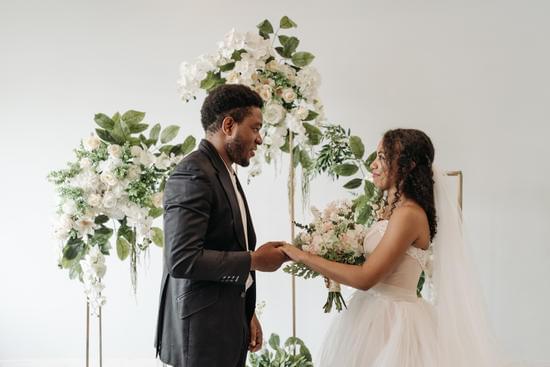Planning a wedding involves careful consideration of many details, including the length of the ceremony and reception. But just how long are weddings?
This article will explore the factors that influence the duration of weddings, compare traditional versus non-traditional wedding lengths, provide common timelines for ceremonies and receptions, offer tips for keeping events on schedule, and examine cultural differences in wedding duration. Whether you’re a newly engaged couple trying to decide on the ideal length for your big day or simply curious about how long weddings typically last, read on to gain insight into this important aspect of wedding planning.
The length of a wedding can be influenced by a variety of factors, from cultural traditions to personal preferences. As couples plan their special day, they often grapple with finding the right balance between creating meaningful moments and ensuring their guests have an enjoyable experience. Understanding how different factors can impact the length of a wedding can help couples make informed decisions as they plan their ceremony and reception.
In addition to exploring these factors, this article will also provide real-life examples of weddings that range from short and sweet to long and lavish. These examples will serve as valuable insights into the impact that various choices – such as venue selection, program design, and cultural customs – can have on the overall length of a wedding.
Whether you’re aiming for a traditional ceremony or thinking outside the box with a non-traditional celebration, it’s important to consider all aspects when determining the perfect length for your own special day.
Factors That Influence the Duration of Weddings
The length of weddings can vary greatly depending on a variety of factors. One major factor that influences the duration of a wedding is the size of the guest list. The more guests there are, the longer the ceremony and reception tend to be.
This is because more guests typically means more socializing, greetings, and interactions throughout the event. On the other hand, smaller, more intimate weddings with fewer guests often have shorter durations as there is less socializing and movement involved.
Another factor that plays a significant role in determining the length of weddings is the cultural or religious traditions being incorporated into the ceremony. For example, certain religious ceremonies may have specific rituals or customs that can add time to the overall duration of the wedding. Similarly, cultural practices such as traditional dances, performances, or attire changes can also influence how long a wedding lasts.
Furthermore, the chosen wedding venue and type of reception can impact how long weddings are. Outdoor ceremonies tend to be shorter than indoor ones due to weather constraints and lighting limitations. Additionally, sit-down dinners often result in longer receptions compared to cocktail-style receptions due to the formal dining process.
| Factor | Influence on Wedding Duration |
|---|---|
| Guest List Size | More guests usually lead to longer ceremonies and receptions |
| Cultural/Religious Traditions | Specific rituals or customs can add time to the overall duration |
| Wedding Venue & Reception Style | Outdoor vs Indoor ceremonies; sit-down dinner vs cocktail-style receptions |
Length of Traditional Weddings vs Non-Traditional Weddings
When it comes to the length of weddings, one important factor to consider is whether the wedding is traditional or non-traditional. Traditional weddings often follow a set timeline and can last several hours, including the ceremony, cocktail hour, dinner, speeches, and dancing. On the other hand, non-traditional weddings may be more flexible in terms of timing and can vary greatly in length based on the couple’s preferences.
In a traditional wedding, the ceremony itself typically lasts around 30 minutes to an hour, depending on religious or cultural customs. This is followed by a cocktail hour for guests while the newlyweds take photos before joining the reception. The reception usually includes dinner service, speeches, first dances, and open dancing that can extend into the late hours of the night.
Non-traditional weddings often have a shorter duration as they may not include all of these formalities. Some non-traditional weddings may consist only of a brief ceremony followed by a casual reception or even just a small gathering with close family and friends. These events can range from just a few hours to an all-day affair depending on what the couple envisions for their special day.
Overall, whether traditional or non-traditional, the length of a wedding ultimately depends on what feels right for the couple and aligns with their vision for their big day. It’s essential to consider what elements are most important to them in order to create a memorable event that reflects their values and love story.
Common Timelines for Wedding Ceremonies and Receptions
When planning a wedding, one of the crucial aspects to consider is the timeline for the ceremony and reception. A well-planned schedule helps ensure that everything runs smoothly and that guests enjoy every moment of the celebration. Here are some common timelines for wedding ceremonies and receptions:
- Pre-Ceremony: The pre-ceremony activities typically include getting ready, taking photos, and the arrival of guests. This can take anywhere from 1-2 hours depending on the size of the wedding party.
- Ceremony: The length of the ceremony itself can vary based on religious or cultural traditions, but typically lasts between 30 minutes to an hour including processional, vows, exchange of rings, readings, and recessional.
- Post-Ceremony: After the ceremony, there is often a receiving line or a brief break before transitioning to the reception venue. This usually takes about 30 minutes to an hour.
Once at the reception venue, the festivities continue with various activities such as cocktail hour, dinner service, speeches, first dance, cake cutting, and dancing. Here’s a general rundown of how long each part may last:
- Cocktail Hour: Typically lasts around 1-1.5 hours as guests mingle and enjoy drinks and hors d’oeuvres.
- Dinner Service: Serving a plated dinner can take about 1.5-2 hours depending on multiple courses or buffet-style meal.
- Speeches and Dances: Including toasts from family and friends as well as special dances (first dance, parent dances) generally takes around 30-45 minutes.
Of course, these timelines can be adjusted based on personal preferences or specific cultural traditions.
Ultimately deciding on how long weddings should be will depend on what feels right for you as a couple. It’s important to find a balance between allowing enough time for meaningful moments while also ensuring that your guests are engaged throughout the celebration. With careful planning and consideration of these common timelines, you can create a wedding day that flows seamlessly and is memorable for all who attend.
Tips for Keeping the Ceremony and Reception on Schedule
Planning a wedding can be a stressful time, and one of the biggest concerns for many couples is how to keep the ceremony and reception on schedule. Here are some tips to help you navigate this often tricky aspect of wedding planning:
- Create a Detailed Timeline: One of the best ways to stay on schedule is to create a detailed timeline for the entire day. This should include not only the start and end times for the ceremony and reception, but also specific time slots for things like photos, speeches, and cake cutting.
- Stick to the Schedule: Once you have a timeline in place, it’s important to stick to it as closely as possible. This may require enlisting the help of a trusted friend or family member to act as a “schedule keeper” during the day, gently nudging everyone back on track if things start to veer off course.
- Communicate with Vendors: Make sure that all of your vendors (photographer, caterer, DJ, etc.) are aware of the timeline for the day and are committed to helping you stay on schedule. Clear communication with your vendors can go a long way in ensuring that everything runs smoothly.
Another way to ensure that your wedding stays on track is to be realistic about what can feasibly be accomplished in the time you have. It’s important to build some cushion into your timeline so that unexpected delays don’t snowball into major disruptions. So whether you’re having a traditional or non-traditional wedding, these tips can help you keep your special day running smoothly.
Ultimately, every couple will have their own vision for their wedding day and how long they want it to last. However, by following these tips and being mindful of factors that influence wedding duration, couples can find the balance that works best for them. Planning ahead, delegating certain tasks on the big day itself ,and being flexible when necessary will all contribute to creating memorable moments without sacrificing efficiency during this once-in-a-lifetime event.
Real-Life Examples of Short vs Long Weddings
When it comes to the length of weddings, there is a wide range of possibilities. Some couples opt for short and sweet ceremonies and receptions, while others choose to celebrate their big day with an all-day event. Let’s take a look at some real-life examples of short vs long weddings to better understand the different approaches couples can take.
Short weddings are often characterized by simple ceremonies followed by intimate receptions that only last a few hours. For example, some couples choose to have a courthouse wedding followed by a small gathering at a local restaurant or their home. These types of weddings typically last around 2-3 hours in total.
In contrast, long weddings may include elaborate ceremonies, multiple-day celebrations, and grand receptions with extensive food and entertainment. For instance, some cultural weddings such as Indian or Nigerian ceremonies can last several days with various traditional rituals and festivities. These types of weddings can span over several days, making them much longer than the average wedding celebration.
| Wedding Type | Duration |
|---|---|
| Short Weddings | Around 2-3 hours |
| Long Weddings | Several days |
Cultural Differences in Wedding Duration
When it comes to the duration of weddings, cultural differences play a significant role in determining the length of the ceremony and celebration. Different cultures have varying traditions and customs that can greatly influence how long a wedding lasts. From the preparations leading up to the big day to the actual ceremony and festivities, cultural norms and expectations can impact the overall duration of the event.
Traditional Cultural Weddings
In many traditional cultures, weddings are elaborate affairs that can span over multiple days. For example, in Indian culture, a traditional wedding ceremony known as “Vivaah Sanskar” can last several days and includes various pre-wedding rituals, the main marriage ceremony, and post-wedding celebrations. Similarly, Nigerian weddings often involve several events such as engagement ceremonies, traditional marriage rites, church weddings, and elaborate receptions, sometimes extending over a week.
Non-Traditional Weddings
On the other hand, non-traditional or modern weddings in some cultures may be much shorter in duration. For instance, in Western cultures, a typical wedding ceremony and reception might take place within a single day or evening. Couples may opt for more streamlined events with only essential rituals and activities to accommodate their preferences and schedules.
Impact on Decision-Making
These cultural differences can pose interesting challenges for couples planning their weddings. It’s essential for them to consider their cultural backgrounds and family expectations when deciding on the length of their wedding events. Finding a balance between honoring tradition and personal preferences is crucial for creating a memorable and meaningful wedding experience that reflects their unique blend of traditions.
Deciding on the Perfect Length for Your Wedding
When it comes to deciding on the perfect length for your wedding, there are several factors to consider. From cultural traditions to personal preferences, finding the right balance for your big day is essential. In this section, we will discuss some key considerations that can help you determine the ideal duration for your wedding ceremony and reception.
Consider Your Ceremony Type
One of the first things to consider when deciding on the length of your wedding is the type of ceremony you will be having. Traditional religious ceremonies, such as Catholic or Hindu weddings, tend to be longer due to the various rituals and customs involved.
On the other hand, civil or non-traditional ceremonies may be shorter in duration. It’s important to take into account the specific requirements and expectations associated with your chosen ceremony type when planning the timeline for your wedding day.
Factor in Cultural Traditions
Different cultures have unique customs and traditions related to weddings, which can significantly impact the length of the celebration. For example, in some cultures, multi-day wedding events are customary, while in others, a simple one-day affair is more common. If you and your partner come from different cultural backgrounds, it’s important to discuss and decide how you will incorporate these traditions into your wedding day timeline.
Consult With Your Vendors
Another crucial aspect of determining the perfect length for your wedding is consulting with your vendors. From photographers and caterers to musicians and venue coordinators, each vendor will play a role in shaping the timeline for your special day.
By discussing your vision and expectations with each vendor, you can gain valuable insights into how long different aspects of the event will take. This information can then be used to create a realistic schedule that allows for a seamless flow of events without feeling rushed or dragged out.
By carefully considering these factors and communicating openly with all parties involved in your wedding planning process, you can confidently decide on the perfect length for your big day that aligns with both your personal preferences and practical considerations.
Conclusion
When it comes to the length of weddings, there is no one-size-fits-all answer. The duration of a wedding ceremony and reception can be influenced by various factors such as cultural traditions, the number of guests, the type of venue, and personal preferences of the couple.
While some couples opt for a traditional full-day affair, others prefer a shorter, more intimate celebration. Finding the right balance for your big day ultimately depends on what feels right for you and your partner.
It’s important to consider that traditional weddings tend to be longer due to religious rituals, formalities, and multiple course meals. On the other hand, non-traditional weddings may be shorter with a more relaxed atmosphere and fewer formalities. However, each couple has the freedom to customize their wedding timeline based on their vision for their special day.
To keep your wedding on schedule, communication is key. Work closely with your vendors and wedding planner to create a realistic timeline that allows time for each aspect of the day without feeling rushed. It’s also helpful to prioritize what elements are most important to you and allocate time accordingly while being flexible enough to adapt if needed.
In conclusion, there is no right or wrong answer when it comes to how long weddings should be. Whether you choose a traditional or non-traditional approach, it’s essential to find the perfect balance that aligns with your vision for this significant milestone in your life. Ultimately, focus on creating a memorable experience for you and your loved ones without feeling constrained by timelines or expectations.
Frequently Asked Questions
How Long Are Weddings on Average?
The average length of a wedding typically ranges from 4-6 hours, although some may last longer depending on cultural or religious customs. This time frame includes the ceremony, cocktail hour, reception, and any other planned events.
How Long Is a Typical Wedding Day?
A typical wedding day can span anywhere from 8-12 hours, starting with pre-ceremony preparations and ending with the last dance at the reception. This allows for ample time to accommodate various traditions, formalities, and celebratory moments throughout the day.
Is 4 Hours Long Enough for a Wedding Reception?
A 4-hour wedding reception can be enough time for a simple and intimate celebration. However, if you have many guests or plan to include multiple traditional events within the reception (such as speeches, dances, and cake cutting), you may want to consider extending it to ensure there’s enough time for everything without feeling rushed.

Welcome to my blog about home and family. This blog is a place where I will share my thoughts, ideas, and experiences related to these important topics. I am a stay-at-home mom with two young children. I hope you enjoy reading it! and may find some helpful tips and ideas that will make your home and family life even better!





